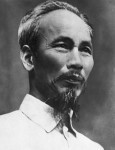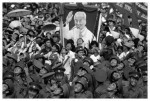 Ho Chi Minh (1890-1969) was a Vietnamese nationalist, revolutionary and political leader. He was the most prominent founding father of modern Vietnam, leading North Vietnam until his death in 1969. Ho Chi Minh was born Nguyen Sinh Cung in 1890. His father, Nguyen Sinh Huy, was a teacher who lost his job for refusing to learn French. As a teenager Nguyen Sinh Cung left Vietnam on a world trip that took him to more than a dozen countries, including the United States, Britain and France. He funded his travel by working as a kitchen hand or waiter. Nguyen also observed poverty, exploitation or worker mistreatment, experiences that coloured his political views. In 1917 Nguyen settled in Paris and became familiar with the writings of Marx, Lenin and other communists. In 1919 he unsuccessfully lobbied Woodrow Wilson and the Versailles peace conference for Vietnamese independence from colonialism.
Ho Chi Minh (1890-1969) was a Vietnamese nationalist, revolutionary and political leader. He was the most prominent founding father of modern Vietnam, leading North Vietnam until his death in 1969. Ho Chi Minh was born Nguyen Sinh Cung in 1890. His father, Nguyen Sinh Huy, was a teacher who lost his job for refusing to learn French. As a teenager Nguyen Sinh Cung left Vietnam on a world trip that took him to more than a dozen countries, including the United States, Britain and France. He funded his travel by working as a kitchen hand or waiter. Nguyen also observed poverty, exploitation or worker mistreatment, experiences that coloured his political views. In 1917 Nguyen settled in Paris and became familiar with the writings of Marx, Lenin and other communists. In 1919 he unsuccessfully lobbied Woodrow Wilson and the Versailles peace conference for Vietnamese independence from colonialism.
In 1920 Nguyen became a foundation member of the French Communist Party. He was sent to study Marxist-Leninism in Moscow and for a time worked with the Comintern, the committee responsible for supporting communist movements around the world. In 1924 Nguyen travelled to China, where he worked with the fledgeling Chinese Communist Party (CCP) and taught at the Whampoa Military Academy. During Nguyen’s time in China, he married Zeng Xueming, a local woman 15 years his junior. When the nationalist government in China began persecuting communists in 1927, Nguyen was forced to flee. He spent the next decade visiting countries as far afield as Belgium, Germany, Switzerland, Italy, China, Hong Kong and Thailand. In 1940 Nguyen began using the name Ho Chi Minh, meaning ‘he who enlightens’. In 1941 Ho returned to Vietnam and took charge of the Viet Minh, a coalition of nationalist and communist groups.

During World War II Ho Chi Minh led the Viet Minh in its struggle against the Japanese occupation force. During this period Ho worked closely with the US Office of Strategic Services (OSS), the forerunner to the Central Intelligence Agency (CIA). Ho and the Viet Minh claimed control of Vietnam briefly in August 1945 (see August Revolution) – however they were displaced by the occupation of northern Vietnam by Chinese nationalist forces and revived French colonial ambitions. When France sought to reestablish their grip on Vietnam it sparked the eight-year-long First Indochina War. Ho Chi Minh became the most significant Viet Minh strategist in this conflict, likening it to a war between an elephant (the French) and a tiger (Viet Minh guerrillas). The Viet Minh emerged victorious in 1954, following the siege and capture of a French air base at Dien Bien Phu.
In 1954 the Geneva Accords divided Vietnam by creating a border along the 17th parallel. The division was meant to be temporary, however, both North Vietnam and the US-backed regime in South Vietnam evolved into independent states. Ho Chi Minh became the figurative leader of North Vietnam. Western perceptions of Ho imagined him as a communist dictator in the mould of Joseph Stalin or Mao Zedong. The reality was that North Vietnam was governed collaboratively by the communist Politburo and Ho, though greatly respected, did not dominate the government. Ho did not live to see North Vietnam’s victory in the Vietnam War (April 1975) or the reunification of Vietnam (July 1976). He died in September 1969. After his death communist leaders positioned Ho at the centre of a prominent personality cult. Ho’s body was preserved and put on public display, his image was integrated into propaganda and Saigon was renamed Ho Chi Minh City. This personality cult was contrary to Ho’s own political views and wishes, however.
Content on this page is © Alpha History 2018-23. This content may not be republished or distributed without permission. For more information please refer to our Terms of Use.
This page was written by Jennifer Llewellyn and Steve Thompson. To reference this page, use the following citation:
J. Llewellyn & S. Thompson, “Ho Chi Minh”, Alpha History, accessed [today’s date], https://alphahistory.com/coldwar/ho-chi-minh/.
